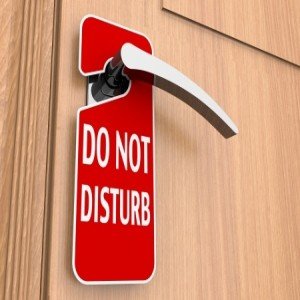The New York state covenant of quiet enjoyment
Whether you are a tenant or a landlord, there are certain limits to the tenant’s right to privacy that must be observed. The first thing to understand is that tenants have a right to privacy; no questions asked. In fact, it’s illegal for a lease to contain wording that waives a tenant’s right to privacy.
New York does not have a state statute that specifies how and when a landlord may enter a tenant’s apartment, but tenants are protected by the New York State Covenant of Quiet Enjoyment. The doctrine limits the landlord’s right of access to the rented unit. What this means is that you have a right to live in the rented unit in peace without worrying that the landlord is going to show up unannounced. It can be considered a criminal violation for the landlord to disregard the doctrine and interfere with your privacy.
Of course, landlords do need to enter rented units. To do this, they must work out a mutually agreeable time to enter either by giving a reasonable period of notice, typically 24 hours or by creating a schedule of times that they can enter. Emergencies are the exception. If there is an emergency, the landlord does not need to provide notice.
The covenant of quiet enjoyment applies to more than just landlords. It also applies to repairmen, realtors, building managers, and anyone else working for the landlord who might need to access the unit. They all must respect a tenant’s right to privacy. Furthermore, a landlord cannot let others into your home without your consent.
Understand Tenant rights
The surest way to figure out where your right to privacy starts and ends is with your lease. Not only does the lease outline the landlord’s rights and responsibilities, it outlines the tenant’s as well. As mentioned above, the lease cannot contain terms that waive your right to privacy, but it may contain information about how often and when the landlord is able to enter the unit.
Understanding your rights and the rental terms to which you’ve agreed will go a long way towards eliminating misunderstandings. It can also give you some direction to take to solve the problem. If your lease specifically states that the landlord cannot enter the unit until noon on a weekday and he routinely shows up at 10:00 a.m., then you have a legal leg to stand on.
Consider also that there are many different cultures in NYC. Some cultures are more open than others and see nothing wrong with entering another’s property, especially if they own the property. Others are more private and resent such intrusions. It’s entirely possible that the tenant and the landlord have a simple miscommunication issue that can be addressed with a quick, non-confrontational conversation. The best results will achieve a mutual understanding and respect between the tenant and landlord and keep the lines of communication open.
Limitations and exceptions on the Tenant’s right to privacy
As in the case of emergencies, there are certain instances in which a landlord can enter the unit without notice. These are:
- When you give permission.Many landlords schedule inspections of the unit every 6-12 months to check for needed repairs or maintenance. This type of inspection should be limited to once or twice a year; anything more than that is unnecessary and could be construed as harassment, which is illegal.
- To make repairs. A landlord can enter a unit to perform maintenance or make repairs, but he or she must still give adequate notice and enter at reasonable hours. This applies to repairmen hired by the landlord, too.
- To show the property. If you’ve decided not to renew your lease, you are obligated to accommodate the landlord’s right to rent out the unit. That means being accommodating when the landlord needs to show the apartment to prospective tenants. A landlord may also need access to your unit if they are selling the building or refinancing it. Still, there are limits to being accommodating. You do not have to accommodate showing on short notice or be constantly asked to leave for a showing.
- If the landlord believes you have abandoned the property. If the landlord has reason to believe that you have left without giving notice, he or she can enter the property. Proof of abandonment must be significant such as shut off utilities and witnesses who saw a moving van. In some cases, the landlord may even enter the unit if you’ve been gone for an extended period of time to perform routine maintenance.
- Entry by health, safety, or building officials. Municipal inspectors have the right to enter your unit if they have reliable information that there is a health or safety issue inside. If you refuse entry, you can expect that they will return with a warrant and a uniformed officer.
- Entry by police. If the officer has a search or arrest warrant you must let them in. They do not have to provide advance notice in these situations and can actually enter the unit by force if necessary.
Accommodate reasonable requests
Although you have a right to privacy, common sense dictates that you accommodate the landlord’s requests for access, assuming they are reasonable. In most cases, the access is to make improvements or repairs that benefit you. Objecting to access too frequently could cause strained relations with the landlord, may lead to an eviction in severe cases, or the non-renewal of your lease.
Contact Brasch Legal to learn more about Tenant’s rights
If you are at all unsure about your landlord’s request for access, feel the requests are too frequent or have a landlord that does not respect your privacy, contact Brasch Legal at 212-267-2500. Our Landlord-Tenant attorneys can review your situation and advise you of your options during a consultation. There are many courses of action and legal remedies to deal with a landlord who ignores your rights.





